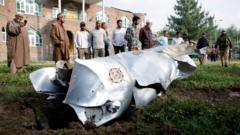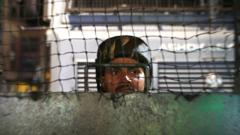The fragile two-month cease-fire between Israel and Hamas has disintegrated, leading to an escalation of violence with Hamas firing rockets into Tel Aviv and Israel expanding its ground offensive in Gaza. Recent Israeli airstrikes have resulted in hundreds of deaths, with both sides entrenched in their positions regarding hostages and ceasefire terms.
Rocket Fire and Ground Assault Mark Escalation in Gaza Conflict

Rocket Fire and Ground Assault Mark Escalation in Gaza Conflict
Renewed fighting erupts as Hamas launches rockets at Tel Aviv while Israeli troops intensify ground operations, signaling a return to total war after a short cease-fire.
Hamas reignited hostilities on Thursday by launching its first rocket attacks into Israeli territory in months, coinciding with an escalation of Israeli ground operations in northern Gaza. The renewed fighting has raised concerns of slipping back into a full-scale war as a two-month cease-fire crumbled under renewed Israeli aerial bombardment, targeting the militant group Hamas.
Initial reports indicated that the rocket barrage aimed at Tel Aviv caused no casualties, with the Israeli military asserting that they were intercepted or fell into empty areas. This display of resistance comes despite a protracted conflict that has lasted over a year. Tensions heightened after Israel's military claimed responsibility for the renewed offensive, arguing that a crucial precondition for the ceasefire—Hamas's release of hostages—was not met.
Tragically, the Israeli health authorities reported over 500 fatalities in Gaza since the renewed assault began three days ago, with many being children, reflecting the dire humanitarian toll of ongoing hostilities. The statistics lack differentiation between militant combatants and civilian casualties.
Earlier, the Israeli military indicated a significant uptick in ground operations, especially around Beit Lahia in northern Gaza. This military maneuver follows Israel's recapture of a strategic corridor, previously relinquished as part of the cease-fire agreement.
Tragedies in the conflict further mounted when Hamas announced that their leadership suffered heavy losses, citing the deaths of at least five prominent figures during recent Israeli strikes. The group has been reticent about identifying casualties stemming from Israeli attacks.
Israeli Prime Minister Benjamin Netanyahu reaffirmed his commitment to amplifying military pressure on Hamas until they release all hostages, comprised of both Israeli citizens and foreign nationals. Meanwhile, Hamas's position maintains that resuming warfare will not lead to more advantageous ceasefire negotiations for Israel.
The cease-fire initiated in January came to a halt in early March, prompting international mediators, including the United States, to venture efforts toward brokering a more permanent peace agreement. The prospect of a durable resolution remains tenuous as both sides stand firm in their demands: Hamas seeks guarantees of security in exchange for disbanding its military arm, while Israel demands the unconditional return of hostages.
As the situation unfolds, approximately 24 hostages are confirmed alive in Gaza, alongside more than 30 deceased, reflecting the complex and tragic human elements intertwined with the ongoing conflict. The summer's violent outbreak began with attacks by Hamas on October 7, 2023, leading to massive geopolitical ramifications in the region.




















